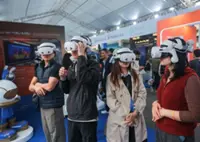Neuralink logo and Elon Musk photo are seen in this illustration taken, December 19, 2022. REUTERS/Dado Ruvic/Illustration
(Reuters) -Billionaire entrepreneur Elon Musk's brain-chip startup Neuralink said on Tuesday it has received approval from an independent review board to begin recruitment for the first human trial of its brain implant for paralysis patients.
Those with paralysis due to cervical spinal cord injury or amyotrophic lateral sclerosis may qualify for the study, it said, but did not reveal how many participants would be enrolled in the trial, which will take about six years to complete.





